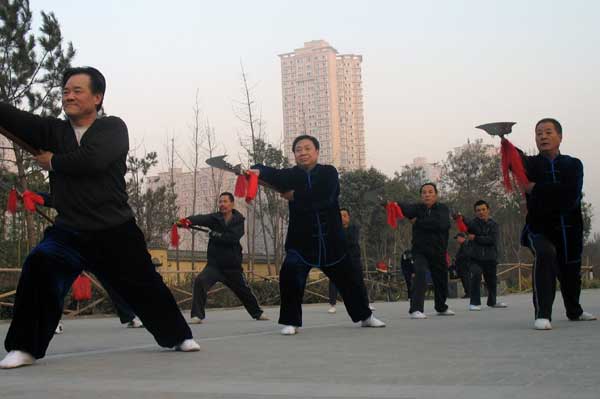Society
Home alone, China's elderly need better care and support
Updated: 2010-12-10 07:37
By Wang Hongyi (China Daily)
 |
|
Elderly people in Xi'an, capital of Shaanxi province, exercise by practicing the art of broadsword on Dec 4. [Wu Kuanhong / for China Daily] |
SHANGHAI - Wang Yuchan, 54, is not always perfectly happy, even though her peers would envy her life.
With a good pension, the retired woman leads a comparatively good life in North China's Tianjin municipality. Her husband works at a State-owned company, and their only son, who is in his 30s, has a decent job in the southern manufacturing hub of Shenzhen.
"My husband and I are getting older and older, and I know that one day we won't be able to get around. I don't know what our lives will be like then," she said.
"We live a good life with a stable income now. But I don't know what will happen when my husband retires. Our only son is very busy. He only comes back during the Spring Festival holiday."
Wang's concerns are well founded. Recently a series of incidents in Nanchang, the capital of East China's Jiangxi province, in which old people died unnoticed in their homes, highlighted the plight of elderly people who live alone.
In October, an old man in Fuzhou, capital of Fujian province, lay undiscovered in his home for a week before neighbors raised the alarm after they noticed a strong stench from his room.
Statistics from the Ministry of Civil Affairs showed that there were 167 million people over the age of 60 in China at the end of 2009, accounting for 12.5 percent of the population. That proportion exceeds the figure of 10 percent recommended by the United Nations.
Nearly half of these older people are living in "empty nests", a term that describes the emerging social situation in which the elderly are forced to live alone as their children live and work in other cities.
As the proportion of the elderly in China's population increases, more attention needs to be given to what extra support older people need.
One problem is that many older people cannot afford the fees charged by many nursing homes and are forced to continue living alone.
In Nanchang, for instance, nursing homes charge more than 1,000 yuan ($150) a month, which is too expensive for many elderly people who survive on a small pension. The city has more than 90,000 elderly people living alone.
"Actually, many cities have been facing the same challenges. The number of government-owned nursing homes, which are cheaper than private ones, is limited. Elderly people have to wait a long time before being admitted to public nursing homes," said Chen Jia, a local social worker.
"The aged care industry is big business. Many private nursing homes provide quality services, but they only welcome those who can afford to pay," said Chen, adding that more nursing homes offering basic care are urgently needed.
Media reports said demand for nursing home beds outnumbers supply by almost 6 million across China.
Shanghai, which in 1999 became the first Chinese city to have an aging population, will have one-third of its population aged 60 or above in 12 years, according to the city's population and family planning commission.
"Public nursing homes are subsidized by the government, but the limited subsidy cannot provide enough beds and professional staff," said Zhang Naizi, president of Shanghai No 3 Social Welfare Home. "The number of beds in public nursing homes is very tight."
The city expects that in the future more than 90 percent of its old people will live at home, receiving more support from better-funded community centers to reduce their isolation and loneliness.
| Poor facilities fail elderly
SHANGHAI - Several elderly residents in the eastern municipality have died while exercising in public places because medical treatment did not reach them on time, local media have reported. Most local residents and workers at Shanghai's parks do not know where to find or how to use the first aid facilities in parks, according to Shanghai-based news portal smg.cn. According to local media, the latest incident occurred in Shanghai on Dec 6 when a man aged about 60 collapsed while jogging on a road near a park. No one there at the time knew where to find the park's first aid kit and the man died on the spot. In November there were other similar cases reported by local media. "I don't know where the emergency medical facility is," said Wang Yuanzheng, a 72-year-old resident who visits People's Park, one of the largest parks in Shanghai. "Usually I take some medicine with me when I walk in the park in the morning because I have high blood pressure," she said. A worker at People's Park, who spoke on condition of anonymity, said that although every park is supposed to provide a first aid service, not many staff members knew where the medical equipment was or how to operate it. "Some parks don't even have first aid facilities," he said. One park in central Shanghai only has a dusty first aid box containing expired medicines, according to a report. Wu Yiyao |
E-paper

Ear We Go
China and the world set to embrace the merciful, peaceful year of rabbit
Preview of the coming issue
Carrefour finds the going tough in China
Maid to Order
Specials

Mysteries written in blood
Historical records and Caucasian features of locals suggest link with Roman Empire.

Winning Charm
Coastal Yantai banks on little things that matter to grow

New rules to hit property market
The State Council launched a new round of measures to rein in property prices.





